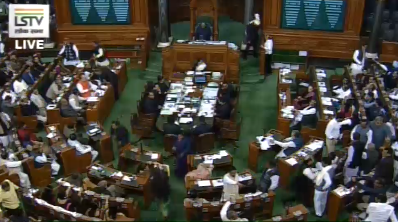The Cabinet today gave its approval to the Aircraft (Amendment) Bill, 2019 to amend the Aircraft Act, 1934.
The bill will now be introduced in the Parliament.
The bill enhances the maximum limit of fine from the existing 10 lakh rupees to one crore rupees.
It also enlarges the scope of the existing Act to include regulation of all areas of Air Navigation.
The amendments would fulfil the requirements of the International Civil Aviation Organization, ICAO.
This will enable the three regulatory bodies in the Civil Aviation sector in India, namely Directorate General of Civil Aviation, Bureau of Civil Aviation Security and Aircraft Accident Investigation Bureau to become more effective, which will lead to enhancement in the level of safety and security of aircraft operations in the country.
The Cabinet also approved the proposal to make amendments in the Insolvency and Bankruptcy Code, 2016 through the Insolvency and Bankruptcy Code (Second Amendment) Bill, 2019.
The amendments aim to remove certain difficulties being faced during insolvency resolution process to realize the objects of the code and to further ease doing of business.
Amendments to the Code to remove bottlenecks, streamline the Corporate Insolvency Resolution Process, CIRP and protection of last-mile funding will boost investment in financially distressed sectors.
Union Cabinet also gave its nod to the proposal of Ministry of Road Transport and Highways, authorizing National Highways Authority of India, NHAI to set up Infrastructure Investment Trust, InvIT as per InvIT Guidelines issued by Securities and Exchange Board of India, SEBI.
It will enable NHAI to monetize completed National Highways that have a toll collection track record of at least one year and NHAI reserves the right to levy a toll on the identified highway.
InvIT as an instrument provides greater flexibility to investors and it is expected to create opportunities like the generation of specialized Operation and Maintenance Concessionaires, attract patient capital to the Indian highway market and retail domestic savings and corpus of special institutions to be invested in the infrastructure sector.
Union Cabinet has also given its nod for signing of Memorandum of Understanding between Central Electricity Authority of India and Japan Coal Energy Centre.
It will provide an enabling framework to address issues and barriers in expediting sustainable, stable and low carbon thermal power development by means of studies, training program and knowledge-sharing activities.
The Cabinet also approved ex-post facto the Memorandum of Understanding between the Central Drugs Standard Control Organization (CDSCO) and Saudi Food and Drug Authority in the field of Medical Products Regulation.
The MoU will facilitate a better understanding of the regulatory aspects between the two sides and help in increasing India’s export of medical products to Saudi Arabia.
The MoU was signed in October this year during the visit of the Prime Minister Narendra Modi to Saudi Arabia.
The Cabinet has given its approval for signing the Memorandum of Cooperation (MoC) between India and Japan to constitute the India-Japan Steel Dialogue to strengthen cooperation in the steel sector.
The MoC will help in capacity building for high-grade steel manufacturing in India.


